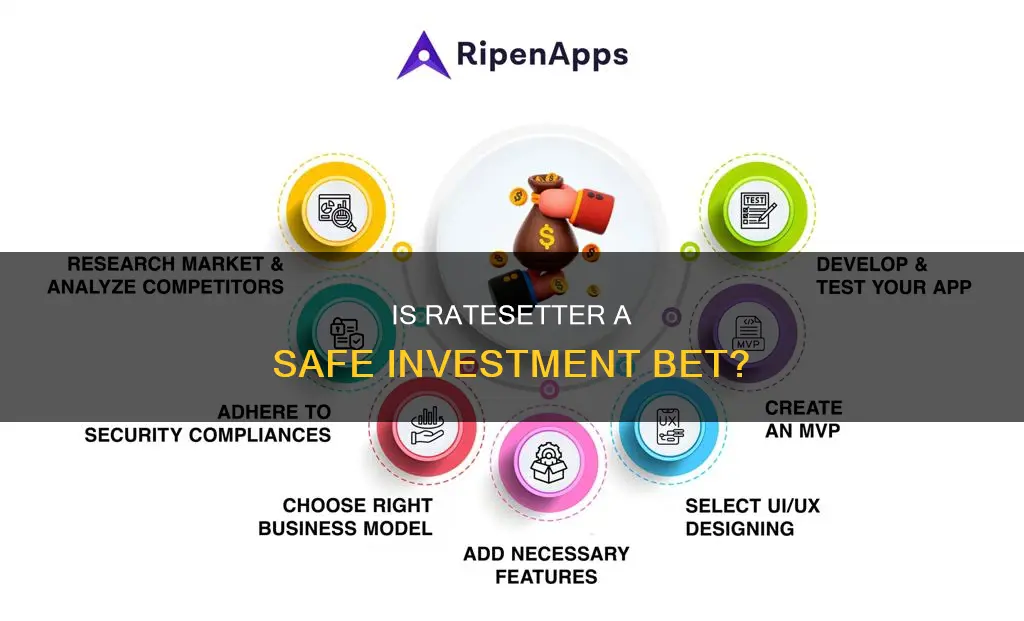
RateSetter is a peer-to-peer lending platform that matches investors with borrowers, including individuals, businesses, or property developers. It is regarded as one of the safer peer-to-peer lending companies, offering simplicity, a provision fund, and a possible exit strategy. However, the Covid-19 pandemic caused a severe liquidity issue, resulting in slow exit times and a decrease in investor return rates. While RateSetter was acquired by Metro Bank, which may provide added financial stability, it closed its doors to everyday investors and will now operate as a standard bank loan issuer. This shift has left some investors dissatisfied, as they will no longer enjoy the high-interest rates they initially signed up for. So, is RateSetter safe to invest in? The answer is nuanced, and while it has a good track record, the recent changes and the ongoing economic downturn may impact its performance and attractiveness to investors.
| Characteristics | Values |
|---|---|
| Risk of company failure | High due to the economic downturn caused by Covid-19 and the possibility of lowering underwriting quality |
| Provision fund | Protects investors from borrower late payments or defaults |
| Financial stability | Pending acquisition by Metro Bank may provide added financial stability |
| Regulatory protection | Regulated by the UK's Financial Conduct Authority; not protected by the Financial Services Compensation Scheme |
| Minimum investment | £10 |
| Returns | Up to 8% per year before Covid-19; up to 4% post-Covid-19 |
| Exit delays | Yes, some customers have complained of long delays (up to seven months) in withdrawing their investments |
| Interest rates | Halved in May 2020 to divert money to the provision fund; returned to normal in January 2021 |
| Customer confidence | High, as demonstrated by a large drop in exit requests to pre-Coronavirus levels |
| Investor accounts | All 45,000 existing investor accounts closed on 2 April 2021 |
What You'll Learn

RateSetter's acquisition by Metro Bank
RateSetter is a peer-to-peer lending company, which matches investors with borrowers, including individuals, businesses, or property developers. It is considered a relatively safe investment option in the peer-to-peer lending space. However, like any investment, there are risks involved.
In 2020, Metro Bank announced its acquisition of RateSetter for an initial price of £2.5 million, with additional payments of up to £9.5 million based on performance over the next three years. The total potential value of the acquisition is £12 million. The acquisition brings RateSetter's talented team, including co-founders Rhydian Lewis and Peter Behrens, and CFO Harry Russell, under the Metro Bank umbrella.
The acquisition is part of Metro Bank's strategy to grow its unsecured lending business and increase profits. Metro Bank will use its deposit base to fund new unsecured personal loans originated through the RateSetter platform, with these loans appearing on Metro Bank's balance sheet. RateSetter will continue to manage the existing loan portfolio and the Provision Fund on behalf of its peer-to-peer investors, with Metro Bank assuming no credit risk for these existing loans.
The acquisition is expected to help Metro Bank better meet customer needs and strengthen its position as the UK's best community bank. It will also provide RateSetter with added financial stability, which may have been impacted by the Covid-19 pandemic. The transaction was subject to approval from the Financial Conduct Authority and RateSetter shareholders, and it is unclear from the sources whether this approval was obtained.
Following the acquisition, RateSetter closed its peer-to-peer lending business to focus on retail lending through Metro Bank. This means that future lending will be offered under both the RateSetter and Metro Bank brands.
Savings and Investments: Strategies for Effective Money Management
You may want to see also

RateSetter's provision fund
RateSetter is a peer-to-peer lending platform that matches investors with borrowers, cutting out banks and offering higher interest rates than traditional savings accounts.
The Provision Fund is intended to cover losses that cannot be recovered from borrowers. In the event of a severe recession or other economic shock, the fund could theoretically be depleted. To prevent this, RateSetter may divert a portion of each lender's loans and interest to the fund. This pooling of loans means that lenders are no longer doing "P2P" lending directly between borrowers and lenders, and any bad debts are shared equally among all lenders.
In 2016, there were concerns that the Provision Fund was running low, with almost 80% of the fund used up by compensating investors. However, RateSetter disputed that it was being pushed to the limit and expressed comfort with the level the fund was being used up. Analysts did not foresee the fund running out in the short term.
In 2020, due to the impact of COVID-19, RateSetter experienced a severe liquidity issue, resulting in slow exit times. To address this, they announced a temporary decrease in investor return rates to divert money into the Provision Fund.
Recording Gains: Equity Method for Investment Sales
You may want to see also

RateSetter's IFISA
RateSetter is a peer-to-peer lending platform that offers investors a blend of different types of lending. It was purchased by Metro Bank in 2020 and subsequently closed its peer-to-peer lending business to focus on retail lending through the bank.
While RateSetter was once considered a relatively safe peer-to-peer lending platform, the Covid-19 pandemic impacted the company's financial stability. RateSetter experienced a severe liquidity issue, resulting in slow exit times for investors. Additionally, there is always a risk that the company could lower its underwriting standards to attract new borrowers, leading to higher defaults. It is important to carefully consider the risks and conduct thorough research before investing.
Crowdfunding's Future: Equity Investment Benefits for Entrepreneurs
You may want to see also

RateSetter's safety compared to other P2P platforms
RateSetter is considered one of the safer peer-to-peer lending companies, although the Covid-19 pandemic has impacted its safety. In May 2020, RateSetter halved the interest it paid to investors, diverting the other half into a 'provision fund' to protect investors from borrower defaults and late payments. This has caused long delays for investors looking to withdraw their investments, with some waiting seven months for their cash.
RateSetter was purchased by Metro Bank in 2020, and closed its peer-to-peer lending business to focus on retail lending through Metro Bank. This means that RateSetter will no longer operate on a peer-to-peer basis, and will instead only issue standard bank loans backed by Metro Bank. This has caused concern for investors, who will no longer enjoy the high returns they signed up for.
Unlike stocks and shares investment platforms, peer-to-peer platforms are not protected by the Financial Services Compensation Scheme (FSCS) if they collapse. This means that if the business model fails, investors could lose all of their investments. However, some sites operate a fund or similar scheme that will cover a lender's losses in some cases.
Compared to other P2P platforms, RateSetter has a good track record of stable, satisfactory returns, beating savings accounts and cash ISAs. One of its draws is that it lends to high-quality borrowers who are considered low risk. However, there is a risk that RateSetter will lower its underwriting standards to attract new borrowers, resulting in higher defaults.
In summary, while RateSetter has historically been a safe investment platform, its acquisition by Metro Bank and the impact of Covid-19 have introduced new risks and uncertainties for investors.
Investment Management Law: Understanding the Basics
You may want to see also

RateSetter's interest rates
RateSetter is a peer-to-peer lending platform that matches investors with borrowers. It was launched in 2010 and was acquired by Metro Bank in 2020.
RateSetter offers three main types of loans: property finance, business finance, and personal loans. The interest rates for these loans are determined by the lenders, who state how much they are willing to loan and the interest rates they expect to see. Borrowers then compete for these loans, stating how much they need to borrow and the interest rates they are willing to pay.
The interest rates offered by RateSetter vary depending on the type of loan and the term. For example, for a representative APR of 6.6%, a borrower would repay £195.23 per month over 5 years at a rate of 6.6% (fixed), totalling £11,713.96.
RateSetter's IFISAs have been reported to offer competitive interest rates compared to cash ISAs and savings accounts. The Access account has been reported to offer interest rates ranging from 2.5% to 4%, with a historical average of 3.1%. The 1-year account offers rates ranging from 3.7% to 5%, with a historical average of 3.7%. The 5-year account offers rates ranging from 5.1% to 6.4%, with a historical average of 5.8%.
It is worth noting that the interest rates offered by RateSetter are subject to change and may have been affected by the economic downturn caused by the COVID-19 pandemic. Additionally, past performance does not guarantee future results, and investors should be aware that their money is at risk.
Saving Relationships: Worth the Investment?
You may want to see also
Frequently asked questions
RateSetter is a peer-to-peer lending platform that allows investors to make loans to individuals and businesses. While RateSetter was considered a relatively safe investment option, the Covid-19 pandemic caused a severe liquidity issue, resulting in slow exit times. Additionally, RateSetter was acquired by Metro Bank, which led to a reduction in interest rates and changes in the business model. Therefore, it is important to carefully consider the risks and conduct thorough research before investing.
RateSetter, one of the UK's biggest peer-to-peer lending platforms, was acquired by Metro Bank in 2020. Following the acquisition, RateSetter closed its doors to everyday investors and transferred all existing investor accounts and loans to Metro Bank. The brand "RateSetter" remained, but it no longer operated on a peer-to-peer basis.
As with any investment, there are risks associated with investing through RateSetter. One risk is the potential loss of investment due to company failure or economic downturns. Additionally, there may be long delays in withdrawing investments, as some customers have experienced wait times of up to seven months for their cash. It's important to note that investments made through RateSetter are not covered by the Financial Services Compensation Scheme (FSCS) in the UK.







